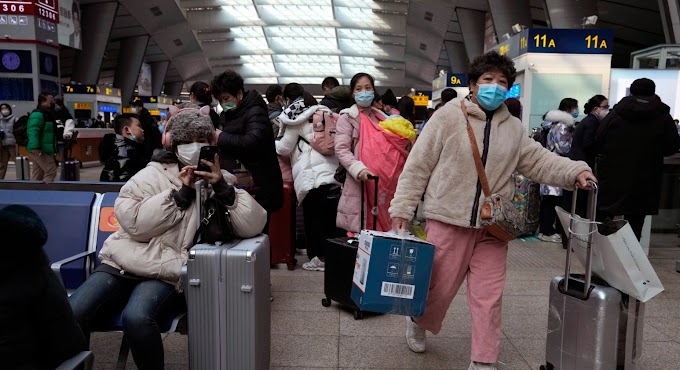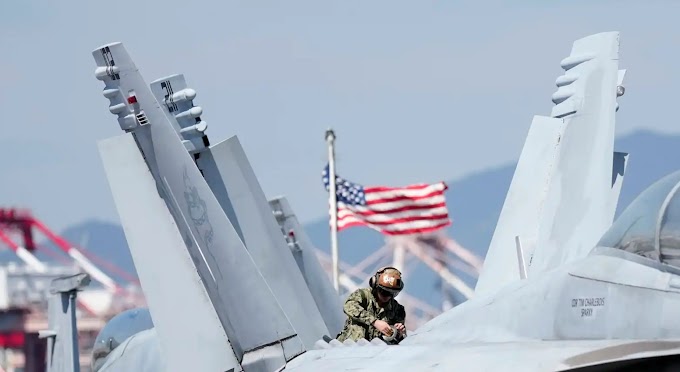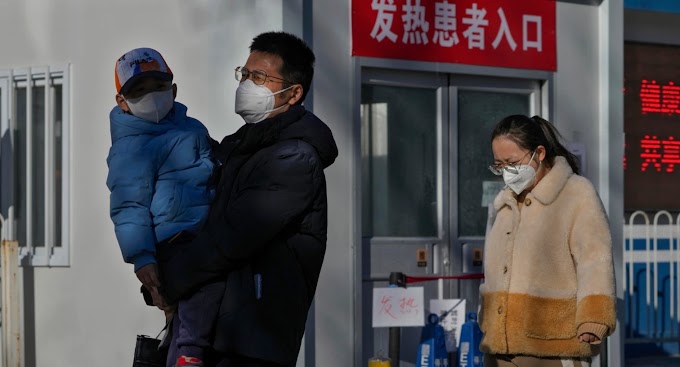Huawei will open another battlefield after the chip is exhausted and retreats from the smartphone market? Analysis: The United States may continue to block
 |
| Chips made by Huawei HiSilicon are displayed at the Huawei China Economic Partnership Conference in Fuzhou, Fujian Province, March 21, 2019. |
WASHINGTON —
According to the latest report by the international research organization Counterpoint Research, the Chinese telecommunications giant (enterprise) Huawei’s inventory of high-end chips used to manufacture smartphones has been exhausted. With the chip supply being cut off by the United States, Huawei may be forced to withdraw from the global smartphone market. However, analysts say that Huawei has high resilience and has opened up new battlefields, deploying new businesses such as 5G cloud services and low-carbon energy. However, the part involving 5G network communications may still attract the attention of the United States and continue to suppress it.
Counterpoint Research, an international research organization, recently released a report saying that after checking and comparing sales data, it found that Huawei has run out of high-end chips designed by its IC factory HiSilicon.
Huawei's Kirin chip share is zero
According to the report, the share of HiSilicon-designed smartphone chips (Kirin series) in the global smartphone application market has slipped from 3% in the second quarter of last year to 0% in the third quarter of this year.
Restricted by the U.S. ban, Huawei’s advanced chip supply channels have been completely cut off, which means that high-end fabs including Taiwan’s TSMC and South Korea’s Samsung cannot continue to manufacture for them. Under this premise, Huawei’s high-end 5G mobile phones use The current Kirin chip may have become extinct.
Since Huawei and HiSilicon were included in the U.S. trade blacklist in 2019, they have urgently hoarded chips for more than a year, but after more than two years, the chip inventory will eventually run out one day.
During Huawei's struggling period, the market had expected and speculated about the comeback of Kirin chips, including the news that Huawei had broken through in November and had applied for a patent for a lithography machine for chip manufacturing, which is expected to break through the bottleneck of the United States, or Huawei SMIC's "chip stacking" patent allows SMIC's 14-nanometer mid-range process to achieve the performance of 7-nanometer chips, or earlier, the Dutch merchant ASML (ASML) reported that it had changed its mind and wanted to sell lithography machines to China.
However, analysts say that the chip and high-tech game between the United States and China has been raised to the level of national strategy, and it is by no means a single company that can reverse it. Therefore, the probability of Huawei successfully breaking through the US blockade in the mobile phone business is not high.

Dale Gai, director of semiconductor research at Counterpoint Research’s Taiwan office, responded to an interview with Voice of America by email, saying, “Based on the current restrictions on the import of high-tech equipment for wafer manufacturing (below 14nm), SMIC’s In the next few years, it is unlikely to establish enough advanced process chips to supply to Huawei. Regarding the possibility of ASML selling lithography machines to Chinese semiconductor factories, although we cannot speak on behalf of the company's executives, we believe that in the short term, the The company will abide by the regulations of the Bureau of Industry and Security of the U.S. Department of Commerce (the ban on sales to China) to protect the rights and interests of its shareholders.” Li Chengdong, a Beijing-based electronics industry analyst and founder of Dolphin Think Tank, also said in an interview with Voice of America that it is difficult for Huawei to bypass US restrictions and find a stable source of chip supply. Moreover, Huawei is a brand that manufactures high-end, high-performance mobile phones. If it is forced to use SMIC's backward manufacturing process to build high-end mobile phones, it will actually damage the brand image.Li Chengdong said: "(Huawei) making a fake 5G mobile phone in order to sell mobile phones is actually unnecessary. In particular, more than 80% of Chinese consumers use 5G mobile phones, but if you push a 4G mobile phone, consumers It’s actually not acceptable.”
The gods fight the little ghosts and suffer?
Li Chengdong lamented that Huawei could have surpassed South Korea's Samsung to become the world's leading smartphone company, but a US-China technology war abruptly knocked Huawei down from the altar, and the mobile phone business shrank sharply as a result. He described this as the two powerhouses of China and the United States. "The gods fight, and the kid suffers."
However, he said that although China is several generations behind the United States in high-end chips, the result of the fierce competition between the United States and China will accelerate the process of localization of chips in China, especially the mid-range chips used in a large number of home appliances. He said that China is also a big exporter of chips, importing about US$400 billion worth of chips last year, but also exporting US$200 billion worth of chips.
He also said that he had talked with Huawei's executives, and that Huawei believes that it has a lot of experience in surviving the crisis and continuing to grow. Therefore, it is still optimistic about the prospects and is also actively deploying new businesses.
Li Chengdong said: "They (Huawei executives) believe that every time Huawei has a crisis, the combat effectiveness of the entire team will increase. For example, this time a major crisis is equivalent to accounting for 50% of the company's smartphone business. We can't say Zero, but at least it was seriously affected, which led to Huawei having to make new adjustments. Now I don’t have 5G chips to use, so we are looking for new breakthroughs. It will readjust the entire team structure and find new fronts , so it has laid out a lot of service industries, that is, cloud (service), that is, 5G technology is applied to different scenarios, such as smart cars and smart ports, to expand this new opportunity.”
After the defeat of the mobile phone business, Huawei has deployed new businesses such as 5G cloud
He said that the global mobile phone market is only 400 billion US dollars in size, but energy is a large market of 10 trillion US dollars. Therefore, Huawei may have struggled with mobile phones, but it is optimistic about the new opportunities brought by new businesses, especially in 5G network technology, Huawei has the most patents.
In the face of the US sanctions against Huawei, Li Chengdong said that China could have targeted the US mobile phone manufacturer Apple to offer corresponding anti-sanctions. However, the sanctions on foreign investment will actually damage China's economy and business environment, which is not conducive to China's long-term development. Therefore, He said that it may be difficult for China to adopt a head-to-head anti-sanctions strategy in the technological hegemony between the two major powers.
Although Huawei has been sanctioned by the United States for many years, Neil Shah, vice president of research at Counterpoint Research in Mumbai, India, said in an email interview with Voice of America that Huawei's patents and vertical integration in 5G technology make it A unique development niche, whether it is a mobile device or a web-side implementation.
Neil Shah said: "Huawei has many 5G patents and is also investing heavily in 6G. Cellular IP is one of the key technologies required for the success of the future networking ecosystem, from mobile phone applications to the Internet of Things, and even Self-driving cars. This means that even if Huawei is excluded from 5G devices or 5G network business in some major markets, it still has influence on mobile communication protocols, which can be licensed to other manufacturers, such as Qualcomm (Qualcomm) ), Ericsson and Nokia to build a sizeable business."
Huawei and Nokia issued a written statement on December 23 announcing that the patent license agreement between the two parties that expires this year will be renewed. A few weeks ago, Huawei also issued a written statement announcing that it had signed a global patent cross-licensing agreement with OPPO Guangdong Mobile Communications Co., Ltd., which covers basic patents for cellular communication standards including 5G standards.
These agreements highlight that Huawei's intellectual property still has a certain status in the global network, which cannot be stripped away by US sanctions.
U.S. will continue to block Huawei's 5G network expansion
However, Li Chengdong believes that network communication is still an area of concern for the United States, so it is impossible for the United States to give up its suppression of Huawei on this battlefield.
The "5G clean network initiative (5G clean network)" proposed by the former US President Trump's administration is to prevent Huawei's information security penetration, calling on all countries to exclude Huawei's participation in the construction of 5G networks. Even with the backing of China, Huawei has managed to penetrate the markets of many other Third World countries, even though its markets in Western countries have been hit hard.
In this regard, Su Yihao, an assistant professor of the Department of Political Science at National Taiwan University in Taipei, said in an interview with Voice of America that Huawei is indeed a resilient company with a lot of experience in quickly recovering from failure. He said that as long as Huawei avoids the US radar, there are still ways to enter the 5G industry.
Su Yihao said: "Although Huawei is gradually losing ground in the European market, it still has a way to win the favor of local governments in some third world (countries)... The United States is actually focusing on neighboring Central and South America, There are countries in Europe, and Asia. If Huawei is purely from a commercial perspective, it can actually enter some 5G industries and operate in some markets that the United States does not value.”
Su Yihao said that Huawei is a "champion enterprise" strongly supported by China, so it has become the target of US sanctions, which has a warning effect. That is, the US uses sanctions on Huawei to warn other Chinese companies. If it constitutes an information security risk or unfair commercial competition, it may be locked by the United States.
The United States seems to have defeated Huawei's mobile phone business. Will it loosen its siege on Huawei in the future? Su Yihao said that it depends on whether Huawei will still threaten the geopolitical interests of the United States in the future.
Su Yihao said: "The next step is to see if Huawei has any new moves, that is, whether it wants to go to the European or Central American market. If Huawei continues to have such a situation, then I think the United States will continue to have so-called A counterattack. However, if Huawei evaluates it by itself, it does not really want to have another foot in the Sino-US cold war. It may just know what to do and put its important business on the side that has more commercial interests. , and no longer intervene in a geopolitics of Cold War strategy.”












